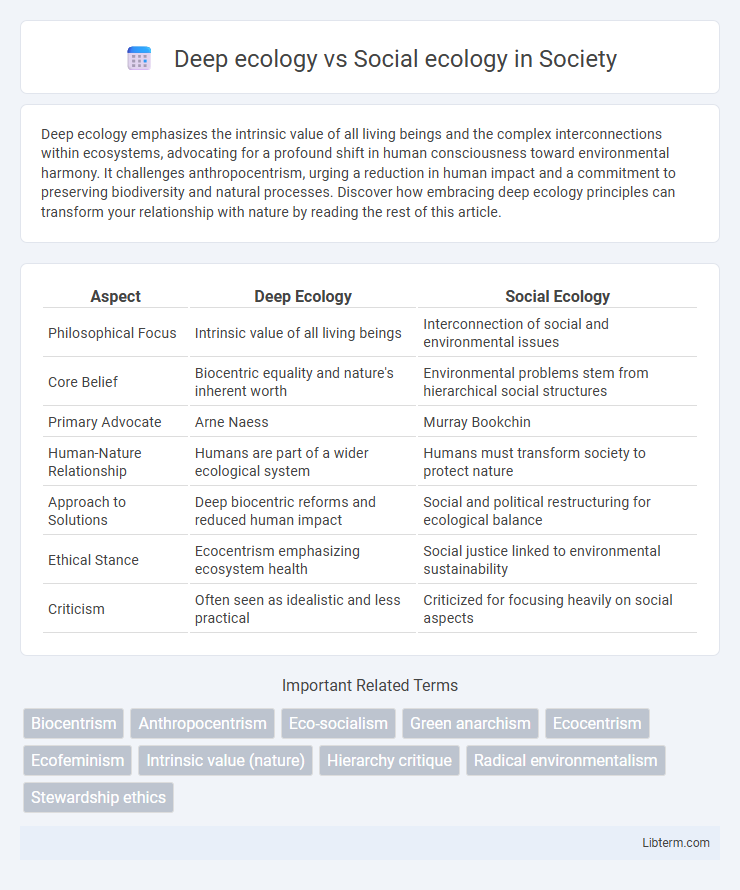Deep ecology emphasizes the intrinsic value of all living beings and the complex interconnections within ecosystems, advocating for a profound shift in human consciousness toward environmental harmony. It challenges anthropocentrism, urging a reduction in human impact and a commitment to preserving biodiversity and natural processes. Discover how embracing deep ecology principles can transform your relationship with nature by reading the rest of this article.
Table of Comparison
| Aspect | Deep Ecology | Social Ecology |
|---|---|---|
| Philosophical Focus | Intrinsic value of all living beings | Interconnection of social and environmental issues |
| Core Belief | Biocentric equality and nature's inherent worth | Environmental problems stem from hierarchical social structures |
| Primary Advocate | Arne Naess | Murray Bookchin |
| Human-Nature Relationship | Humans are part of a wider ecological system | Humans must transform society to protect nature |
| Approach to Solutions | Deep biocentric reforms and reduced human impact | Social and political restructuring for ecological balance |
| Ethical Stance | Ecocentrism emphasizing ecosystem health | Social justice linked to environmental sustainability |
| Criticism | Often seen as idealistic and less practical | Criticized for focusing heavily on social aspects |
Introduction to Deep Ecology and Social Ecology
Deep ecology promotes intrinsic value of all living beings and advocates for radical ecological reform based on deep biocentric equality, emphasizing harmony between humans and nature. Social ecology links environmental issues directly to social problems, arguing that ecological degradation stems from hierarchical and capitalist social structures that must be dismantled to achieve sustainability. Both frameworks challenge traditional environmentalism but differ fundamentally in their philosophical roots and proposed solutions.
Historical Backgrounds of Each Philosophy
Deep ecology, founded by Arne Naess in the 1970s, emerged from a growing environmental awareness emphasizing intrinsic value in nature and advocating for radical ecological balance. Social ecology, developed by Murray Bookchin in the 1960s, links ecological issues directly to social hierarchies and capitalism, promoting decentralized, nonhierarchical communities for environmental sustainability. Both philosophies arose amid escalating environmental crises but diverge in historical focus: deep ecology on biocentric equality and social ecology on socio-political structures as root causes of ecological problems.
Core Principles of Deep Ecology
Deep ecology emphasizes intrinsic value in all living beings, advocating for biocentric equality and recognizing the interconnectedness of human and non-human life. It calls for a profound shift in human consciousness to prioritize ecological sustainability over economic growth, promoting diversity and the preservation of natural ecosystems. Core principles include self-realization, ecological wisdom, and a solidarity that extends beyond anthropocentrism to encompass the entire biosphere.
Fundamental Beliefs of Social Ecology
Social ecology fundamentally believes that environmental problems stem from hierarchical and social injustices, emphasizing the need to dismantle oppressive social structures to achieve ecological balance. It advocates for a direct relationship between social equity and environmental health, promoting decentralized, community-based political structures as a solution. Unlike deep ecology's focus on intrinsic nature value, social ecology prioritizes transforming human social systems to address ecological crises.
Approaches to Environmental Ethics
Deep ecology emphasizes intrinsic value in all living beings and advocates for biocentric equality, promoting radical changes in human-nature relationships to address environmental concerns. Social ecology critiques hierarchical social structures as the root of ecological problems, focusing on the interconnectedness of social justice and environmental sustainability to foster community-based ecological practices. Both approaches challenge anthropocentrism but differ in their focus on either intrinsic nature value or the social systems driving environmental degradation.
Human-Nature Relationship in Both Perspectives
Deep ecology emphasizes intrinsic value of all living beings, advocating for a biocentric human-nature relationship where nature is respected as an interconnected whole beyond human interests. Social ecology critiques hierarchical social structures as the root cause of ecological problems, promoting a synergistic human-nature relationship through community-based, egalitarian social systems. Both perspectives challenge anthropocentrism but differ in focusing on ecological ethics versus socio-political reform to achieve sustainable harmony with nature.
Critiques and Controversies of Deep Ecology
Deep ecology faces critiques for its perceived philosophical anthropocentrism and potential neglect of social justice issues, emphasizing intrinsic nature value but sometimes underestimating human social systems. Critics argue deep ecology's strong biocentrism can alienate marginalized communities by prioritizing non-human life over urgent human needs, raising ethical debates about environmental priorities. Social ecology counters these controversies by linking ecological problems directly to social hierarchies and advocating systemic social reforms for environmental sustainability.
Critiques and Challenges Facing Social Ecology
Social ecology faces critiques for its anthropocentric bias, which some argue limits its ability to address ecological problems intrinsically linked to non-human nature. Critics also challenge its reliance on decentralized, community-based solutions, suggesting that such approaches may struggle against global environmental issues driven by powerful economic and political forces. The tension between social ecology's focus on social hierarchies and the broader, more biocentric perspectives of deep ecology highlights ongoing debates about the root causes of ecological crises and appropriate remedies.
Real-World Applications and Impact
Deep ecology emphasizes intrinsic value of all living beings, influencing conservation policies and promoting biodiversity through grassroots movements and wilderness preservation efforts. Social ecology addresses structural social issues like hierarchy and capitalism as root causes of environmental degradation, leading to community-based urban planning, cooperative housing, and eco-social justice initiatives. Real-world applications of these theories include deep ecology's impact on protected natural reserves and social ecology's role in creating sustainable, equitable local governance models.
Future Directions and Reconciliation Possibilities
Future directions in deep ecology emphasize biocentric preservation and intrinsic value of all living beings, advocating radical changes to human-nature relationships. Social ecology focuses on dismantling hierarchical social structures and promoting ecological democracy as a pathway to environmental sustainability. Reconciliation possibilities include integrating deep ecology's respect for nature with social ecology's emphasis on social justice and collective responsibility, fostering holistic approaches that address both ecological preservation and equitable social systems.
Deep ecology Infographic

 libterm.com
libterm.com